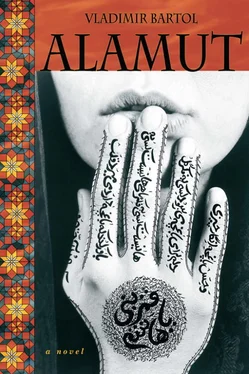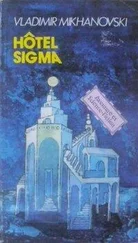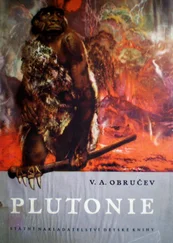Vladimir Bartol - Alamut
Здесь есть возможность читать онлайн «Vladimir Bartol - Alamut» весь текст электронной книги совершенно бесплатно (целиком полную версию без сокращений). В некоторых случаях можно слушать аудио, скачать через торрент в формате fb2 и присутствует краткое содержание. Город: Berkeley, Год выпуска: 2012, ISBN: 2012, Издательство: North Atlantic Books, Жанр: Историческая проза, на английском языке. Описание произведения, (предисловие) а так же отзывы посетителей доступны на портале библиотеки ЛибКат.
- Название:Alamut
- Автор:
- Издательство:North Atlantic Books
- Жанр:
- Год:2012
- Город:Berkeley
- ISBN:9781583946954
- Рейтинг книги:2.8 / 5. Голосов: 5
-
Избранное:Добавить в избранное
- Отзывы:
-
Ваша оценка:
- 60
- 1
- 2
- 3
- 4
- 5
Alamut: краткое содержание, описание и аннотация
Предлагаем к чтению аннотацию, описание, краткое содержание или предисловие (зависит от того, что написал сам автор книги «Alamut»). Если вы не нашли необходимую информацию о книге — напишите в комментариях, мы постараемся отыскать её.
Alamut — читать онлайн бесплатно полную книгу (весь текст) целиком
Ниже представлен текст книги, разбитый по страницам. Система сохранения места последней прочитанной страницы, позволяет с удобством читать онлайн бесплатно книгу «Alamut», без необходимости каждый раз заново искать на чём Вы остановились. Поставьте закладку, и сможете в любой момент перейти на страницу, на которой закончили чтение.
Интервал:
Закладка:
“Whoever intends to scale al-Araf has to be master over love too.”
“I understand.”
“What do you think of me now?”
Ibn Tahir smiled.
“I feel much closer to you.”
“Now perhaps you also understand what it means to observe the world for forty years with a great plan in your heart. And to spend twenty years searching for the chance to realize a great dream. Such a plan and such a dream are like an order that you’ve received from an unknown commander. The world around you is like an enemy army besieging a fortress. You have to get out of the fortress alive if you want to get your order out through the enemy forces. You have to be brave and yet you have to keep your head on your shoulders. Bold and cautious at the same time… Is that clear?”
“It’s becoming clear, Sayyiduna.”
“Do you still think I’m a vicious criminal?”
“No. From the perspective that I see you in now, you’re not a criminal.”
“Would you have the courage to climb al-Araf?”
“From now on it will be my only passion.”
Hasan stepped up to him and cut his bonds.
“Get up. You’re free.”
Ibn Tahir looked at him, uncomprehendingly.
“What do you mean? I don’t under—” he stammered.
“You’re free!”
“What? Me? Free? After I came here to murder you?”
“Ibn Tahir is gone. Now you’re just Avani. You’ve begun your ascent of al-Araf. One crow doesn’t peck the other’s eyes out.”
Ibn Tahir burst into tears. He threw himself at his feet.
“Forgive me! Forgive me!”
“Get far away from here, son. Study, get to know the world. Be afraid of nothing. Cast aside all your prejudices. Let nothing be too lofty or too base for you. Explore everything. Be brave. When nothing remains for you to draw counsel from, come back here. I may not be here anymore. But my people will be. You’ll be welcome, I’ll see to it. When that happens, you’ll be at the summit of Araf.”
Ibn Tahir eagerly kissed his hand. Hasan lifted him up and looked deeply into his eyes for a long time. Then he embraced and kissed him.
“My son,” he stammered, his eyes glistening. “This old heart is happy for you. I’ll give you some money and arrange for you to get anything you might need for your journey…”
Ibn Tahir was moved.
“May I take one more look at the gardens?”
“Come with me to the top of the tower.”
They went out onto the platform and looked down into the gardens. Ibn Tahir sighed. Then he was overcome with emotion. He lay his head down on the rampart and began to cry uncontrollably.
They went back inside and Hasan issued the necessary orders. Ibn Tahir took his things with him, including his poems. They were a precious memento. That same day he rode out from the castle, well armed, supplied with money, and with a pack mule to one side. He looked around himself with wide-open eyes. The whole world seemed reborn and new. He felt as though he had just now opened his eyes. A thousand questions were waiting to be answered. Ibn Tahir the feday had died, and the philosopher Avani had been born.
Hasan returned to his chambers with an unfamiliar, wonderful feeling in his heart. A while later the grand dais rushed in to see him, out of breath.
“What does this mean? Do you know that ibn Tahir has just ridden out of the castle? Everyone saw him.”
Hasan laughed lightheartedly.
“You’re mistaken. Your eyes have deceived you. Ibn Tahir died as a martyr for the Ismaili cause. That must have been someone else you saw. By the way, something pleasant has happened to me, and I’ve been meaning to tell you: I have a son.” The grand dais looked at each other and shook their heads.
The detachment that had escorted ibn Tahir to Alamut headed back toward Nehavend with ibn Vakas as its prisoner. Along the way they paid particular attention to the news. They were waiting for reports of the Ismaili leader’s murder to spread. But there were no such reports.
In Nehavend, Fahr al-Mulk, the son of the dead grand vizier, ordered that his father’s murder be avenged and the escape of the true murderer be covered up by having ibn Vakas beheaded as the vizier’s murderer.
By that time ibn Tahir had already crossed the border of Iran and arrived in India.
CHAPTER NINETEEN
Express messengers flew with the news of the grand vizier’s murder from one country to the next, arousing fear throughout the great Seljuk realm. It triggered innumerable unforeseen consequences and caused widespread uncertainty and confusion.
The fortress of Gonbadan near the city of Girdkuh, the Ismaili stronghold in Khuzestan, which had been out of food and water and on the verge of surrendering, was liberated from its besiegers overnight, just like Alamut. The grand vizier, the Ismailis’ mortal enemy, was dead. His successor, Taj al-Mulk, was reputed to be Hasan’s friend, so Kizil Sarik’s forces abandoned their siege and dispersed even before the commander received any instructions from the sultan or the new vizier. The way to the castle was free to Hasan’s messenger, who brought Husein Alkeini’s successor, sheik ibn Atash, an order to hand over the murderer of the grand dai. As early as the next day, a large, well-armed caravan transporting Hosein in irons set out for Alamut.
News of the grand vizier’s murder finally reached the sultan’s eldest son, Barkiarok, who was leading a campaign against rebels on the border with India. He turned over command of part of the army to his brother Sanjar, then, with the remaining units, sped precipitously back to Isfahan to defend his inheritance and thwart any possible designs of his step-mother Turkan Khatun and her vizier, Taj al-Mulk.
In the meantime, in Isfahan Taj al-Mulk had made all preparations to proclaim four-year-old Mohammed the heir to the throne. The chief opponent of this plan was now gone, and the wavering sultan had no one to shore up his will against the demands of his youngest and most determined wife. Just then he was in Baghdad observing some of the greatest celebrations and ceremonies ever held. Besides the caliph, more than a thousand subject kings, princes and grandees from all the corners of his empire were paying tribute to him. He was at the height of his glory and power. Not even the death of his loyal advisor of many years could spoil his sense of his own majesty. He wanted for nothing. He was thoroughly happy.
The news of the dispersal of the sultan’s armies outside of Alamut and Gonbadan alerted the cautious Taj al-Mulk to the danger that threatened the realm from his erstwhile ally Hasan. Now that he had taken Nizam al-Mulk’s place as administrator of the great Iranian empire, he felt the full weight of his responsibility for peace and order throughout the realm. The sultan’s firm command that he deal ruthlessly with the Ismailis was practically made to order for him. He immediately relieved the emirs Arslan Tash and Kizil Sarik of their posts and appointed two young and forceful Turkish officers in their place. They were to collect and regroup the scattered units and use them to attack Alamut and Gonbadan once again.
“We’ve had enough excitement lately,” Hasan said to his two dais. “We need a rest so we can get ready to continue the fight. Just as importantly, we need to repair the breaches in our edifice. So let’s try to reach an honorable peace with the sultan.”
A feday named Halfa was assigned to ride to Baghdad with the written terms for the sultan, in which Hasan made the following stipulations: That he return to the Ismailis all of the castles and fortresses they had held before the grand vizier attacked them. The sultan would have to pay reparations for the castles damaged or destroyed. In return, Hasan would pledge not to acquire any new strongholds. At the same time, he would be prepared to defend the entire northern border of the realm against barbarian incursions. The sultan would have to pay him fifty thousand gold pieces per year to maintain that army.
Читать дальшеИнтервал:
Закладка:
Похожие книги на «Alamut»
Представляем Вашему вниманию похожие книги на «Alamut» списком для выбора. Мы отобрали схожую по названию и смыслу литературу в надежде предоставить читателям больше вариантов отыскать новые, интересные, ещё непрочитанные произведения.
Обсуждение, отзывы о книге «Alamut» и просто собственные мнения читателей. Оставьте ваши комментарии, напишите, что Вы думаете о произведении, его смысле или главных героях. Укажите что конкретно понравилось, а что нет, и почему Вы так считаете.












